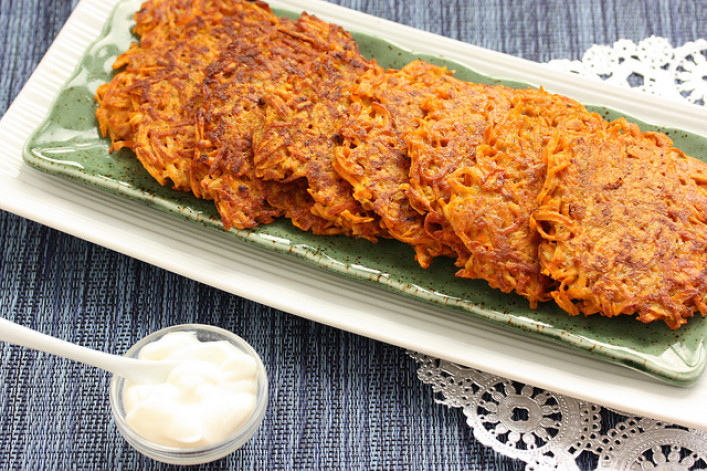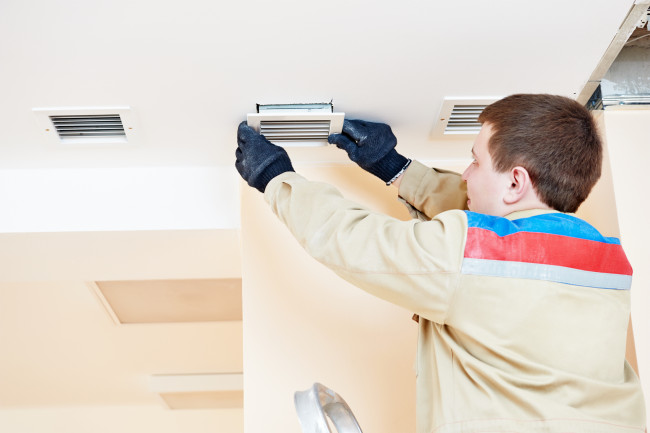It's latke season—but your apartment doesn't have to smell like them

A few years ago, we began buying latkes and reheating them instead of making them from scratch.
For the same reason, we wear an old coat when we visit someone else’s apartment for Hanukkah: We know that the onion-y, oily odor of bespoke latkes will cling to our clothes days after we've sated our appetite for potato pancakes.
[This story originally ran in December 2009. With latke season in full swing, we're revisiting this time-tested holiday problem for New Yorkers in 2016.]
So, on behalf of ventilation-challenged apartment dwellers everywhere, we vowed to get to the bottom of the Big Stink: Why are latkes so smelly and what can be done about it?
For some answers, we turned to Pamela Dalton, an odor scientist at Pennsylvania’s Monell Chemical Senses Center.
She quickly identified the two obvious culprits: the oil and the onion. “When we use oil, particularly those that smoke at lower temperatures, that smoke actually contains ‘volatiles,’” says Dalton. “Volatiles are the chemical molecules that we smell—they have the ability to become airborne.”
The volatile-laden smoke from the frying pan (it doesn’t even have to be smoke—an oily mist will suffice) condenses on surfaces when it cools. It bears the scent of the oil itself and, more offensively, the pungent, sulfurous odor of onion.
Herewith, some recommendations for protecting your olfactory zone during Hanukkah:
1. Keep all bedroom and closet doors closet. The Kitchn points out that fabric absorbs odors, so to keep the smells from totally permeating your apartment, shut as many doors as possible. You can also roll up a towel and stuff it in front of the door to block passage of air underneath the door.
2. Skip the onions altogether, or switch from regular white cooking onions (loaded with sulfurous volatiles) to sweeter onions like Vidalia.
3. Use clean oil rather than strained, recycled oil. And if it burns or contains many black bits, wipe out the pan and refresh between batches.
4. Keep the cooking temperature low enough so the oil doesn’t smoke (or mist). You may also want to experiment with oils that smoke at higher temperatures, like peanut or other nut oils (though traditionalists may argue that it changes the taste).
5. If you don’t have an outside-vented exhaust fan (such fans are only partially effective anyway, since smelly oil deposits tend to build up around the filter), buy activated charcoal sheets from Home Depot or your hardware store, then tape or clip them to a tabletop fan set on reverse. “It will trap a good percentage of odors,” says Dalton.
6. Allow air to circulate out. If you have a vent over your stove, use it. If it's not too cold, open your windows. And even better: set up a fan to carry odors out the window.
7. Sprays like Oust or Febreze may bring temporary relief by coating the odor molecules so that they are heavier than air and thus no longer able to float into your sniffer. But eventually the coating will wear off and at least some of the odor will return, says Dalton.
8. While some people recommend negative ion generators, Dalton advises against them: “They produce ozone which will break down certain organic molecules into other compounds that sometimes don’t smell, but they generate really unacceptable levels of ozone in an indoor environment that can cause problems even for healthy people.”
9. Candles, pot pourri etc: Pick herbaceous over fruity. “You want something that will blend with the onion rather than try to overcome it,” says Dalton.
10. Put a small bowl of white vinegar, baking soda or coffee grounds on the counter overnight. According to The Kitchn, "any of the three will naturally dissipate any remaining cooking smells by morning."
We also flipped our question to the always-helpful Help A Reporter Out network of experts and interested bystanders. Suggestions include:
- Cook your latkes outside if you have outdoor space and an electric frying pan or grill (throw a pan on top of the grill rack). Variation: Freeze, defrost, and reheat for Hannukah.
- Top your frying pan with an odor-absorbing splatter screen containing a layer of carbon fabric sandwiched between two metal mesh screens.
Last but not least: avoidance. Buy your latkes elsewhere and reheat them.
You Might Also Like

























